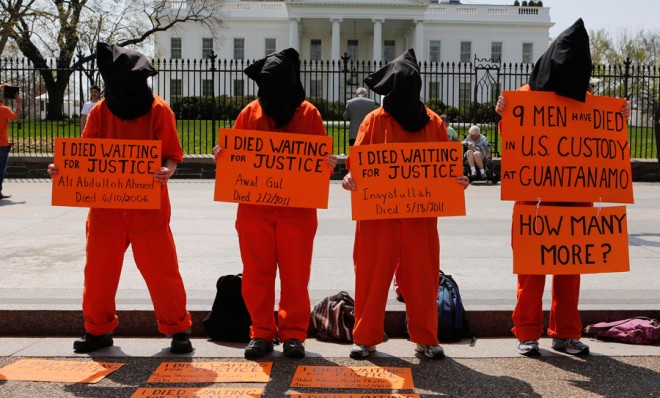How bad is the Guantanamo Bay hunger strike?
A new op-ed by a Yemeni national shines a light on the increasingly volatile conditions inside of Gitmo

A free daily email with the biggest news stories of the day – and the best features from TheWeek.com
You are now subscribed
Your newsletter sign-up was successful
"I've been on a hunger strike since Feb. 10 and have lost well over 30 pounds," Samir Naji al Hasan Moqbel, a prisoner at Guantanamo Bay since 2002, says in The New York Times. "I will not eat until they restore my dignity."
The Yemeni national's op-ed, told to his lawyers through an Arabic translator, capped a volatile weekend for the United States in Guantanamo Bay. On Saturday morning, U.S. military forces raided communal cell blocks in hopes of ending a three-month hunger strike, which, according to the Miami Herald, was sparked by searches for the captives' Korans and "fueled by years of frustration at their status of legal limbo."
Detainees defended themselves with improvised weapons including broomsticks and water bottles but, according to NPR, were ultimately subdued and put in individual cells, with one detainee reportedly injured by a rubber bullet.
The Week
Escape your echo chamber. Get the facts behind the news, plus analysis from multiple perspectives.

Sign up for The Week's Free Newsletters
From our morning news briefing to a weekly Good News Newsletter, get the best of The Week delivered directly to your inbox.
From our morning news briefing to a weekly Good News Newsletter, get the best of The Week delivered directly to your inbox.
How bad has the hunger strike gotten? NPR reports that anywhere from 43 to 60 of the total 166 detainees are refusing to eat. When the Miami Herald's Carol Rosenberg visited in March, she said it was "clear that guards had lost a measure of control over life inside the communal blocks," with detainees covering surveillance cameras with cereal boxes and refusing to admit food carts.
Moqbel, who says that he has been detained for 11 years without a trial or being charged with a crime, described the experience of being force-fed:
I will never forget the first time they passed the feeding tube up my nose. I can't describe how painful it is to be force-fed this way. As it was thrust in, it made me feel like throwing up. I wanted to vomit, but I couldn't. There was agony in my chest, throat, and stomach. I had never experienced such pain before. I would not wish this cruel punishment upon anyone. [New York Times]
Glenn Greenwald of The Guardian writes that 58 of the detainees who've been cleared for release are, like Moqbel, from Yemen. Another Yemeni, Adnan Farhan Abdul Latif, died in September 2012 in a suspected suicide. Latif had been ordered free by a federal district court judge. Moqbel says that he fears he will also end up dead:
I do not want to die here, but until President Obama and Yemen's president do something, that is what I risk every day. Where is my government? I will submit to any "security measures" they want in order to go home, even though they are totally unnecessary.
I will agree to whatever it takes in order to be free. I am now 35. All I want is to see my family again and to start a family of my own.
The situation is desperate now. All of the detainees here are suffering deeply. At least 40 people here are on a hunger strike. People are fainting with exhaustion every day. I have vomited blood. [New York Times]
Part of the problem facing Gitmo detainees like Moqbel is that after a terrorist plot was uncovered in 2009, President Obama issued a blanket moratorium in January 2010 to prevent Yemeni detainees from being released, even if they had been given clearance to go home. How long will they remain in the prison? The Boston Globe points to investments in fiber-optic cable and specialized medical care for aging detainees to suggest that "some will be held there for the rest of their natural lives."
A free daily email with the biggest news stories of the day – and the best features from TheWeek.com
Keith Wagstaff is a staff writer at TheWeek.com covering politics and current events. He has previously written for such publications as TIME, Details, VICE, and the Village Voice.
-
 What are the best investments for beginners?
What are the best investments for beginners?The Explainer Stocks and ETFs and bonds, oh my
-
 What to know before filing your own taxes for the first time
What to know before filing your own taxes for the first timethe explainer Tackle this financial milestone with confidence
-
 The biggest box office flops of the 21st century
The biggest box office flops of the 21st centuryin depth Unnecessary remakes and turgid, expensive CGI-fests highlight this list of these most notorious box-office losers